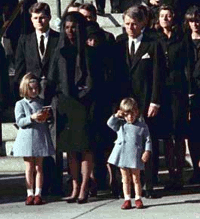
Common Core State Standard
SL.CCS.1/2/3/4 Grades 6-12: An essay of a current news event is provided for discussion to encourage participation, but also inspire the use of evidence to support logical claims using the main ideas of the article. Students must analyze background information provided about a current event within the news, draw out the main ideas and key details, and review different opinions on the issue. Then, students should present their own claims using facts and analysis for support. FOR THE WEEK OF NOV. 18, 2013 This week marks 50 years since President John F. Kennedy’s assassinationLook for a photo gallery or video about JFK and jot down a few emotions you feel.
Read and share someone’s recollection of that day 50 years ago.
See if you spot coverage about how the assassination affected TV, journalism or popular culture. List a few things you learn.
The 50th anniversary of a vivid national turning point is being discussed this week by Americans of all ages. Older ones remember it directly from black-and-white TV newscasts. Others have read about it, watched videos and perhaps have seen anniversary week programs on just about every channel. The observances recall the Nov. 22, 1963 assassination of President John F. Kennedy as he rode through downtown Dallas, sitting next to his wife in a convertible. Grief, shock and disbelief gripped the country. Ask any grandparent or older adult where he or she was when the news came a half-century ago and there will be no hesitation recalling the awful moment. “It was like we all felt on 9/11,” recalls Bob Schieffer, a veteran CBS correspondent who covered the tragedy. “We didn't know what it meant. We didn't know if this was the beginning of World War III.” Emotions were tugged further when suspected assassin Lee Harvey Oswald was shot fatally while in police custody, a shocking event televised live. Historians and ordinary people say America wasn’t the same after those days. “Loss of innocence” is among descriptions frequently used. “We’ll never be young again,” a U.S. senator named Daniel Patrick Moynihan was quoted as saying. One reason it’s seen as a turning point is because the following years in that decade of the 1960s were uneasy – with an unpopular military draft, protests against U.S. fighting in Vietnam and two more assassinations that claimed civil rights leader Martin Luther King and presidential candidate Robert Kennedy, younger brother of JFK. Commemorations this Friday will include ringing church bells throughout Dallas, a military flyover and a moment of silence at 12:30 p.m., the time Kennedy was shot.
Front Page Talking Points is written by
Alan Stamm for NIEonline.com, Copyright 2026
Front Page Talking Points Archive►Australia is a test case for social media age limits, with 16 as a minimum for accounts there now ►U.S. actions at sea against suspected drug smugglers raise military law issues ►Say goodbye to new pennies, a coin that outlived its purpose after 232 years ►Show of force: U.S. naval and air buildup near Venezuela signals possible military action ►Google targets organized scammers in China to block online access ►U.S. government stays away again as global leaders hold yearly climate change strategy session ► Political fight over federal spending nearly interrupts food aid for needy Americans ►Quick removal of White House wing for large ballroom is latest flashpoint for Trump critics |

